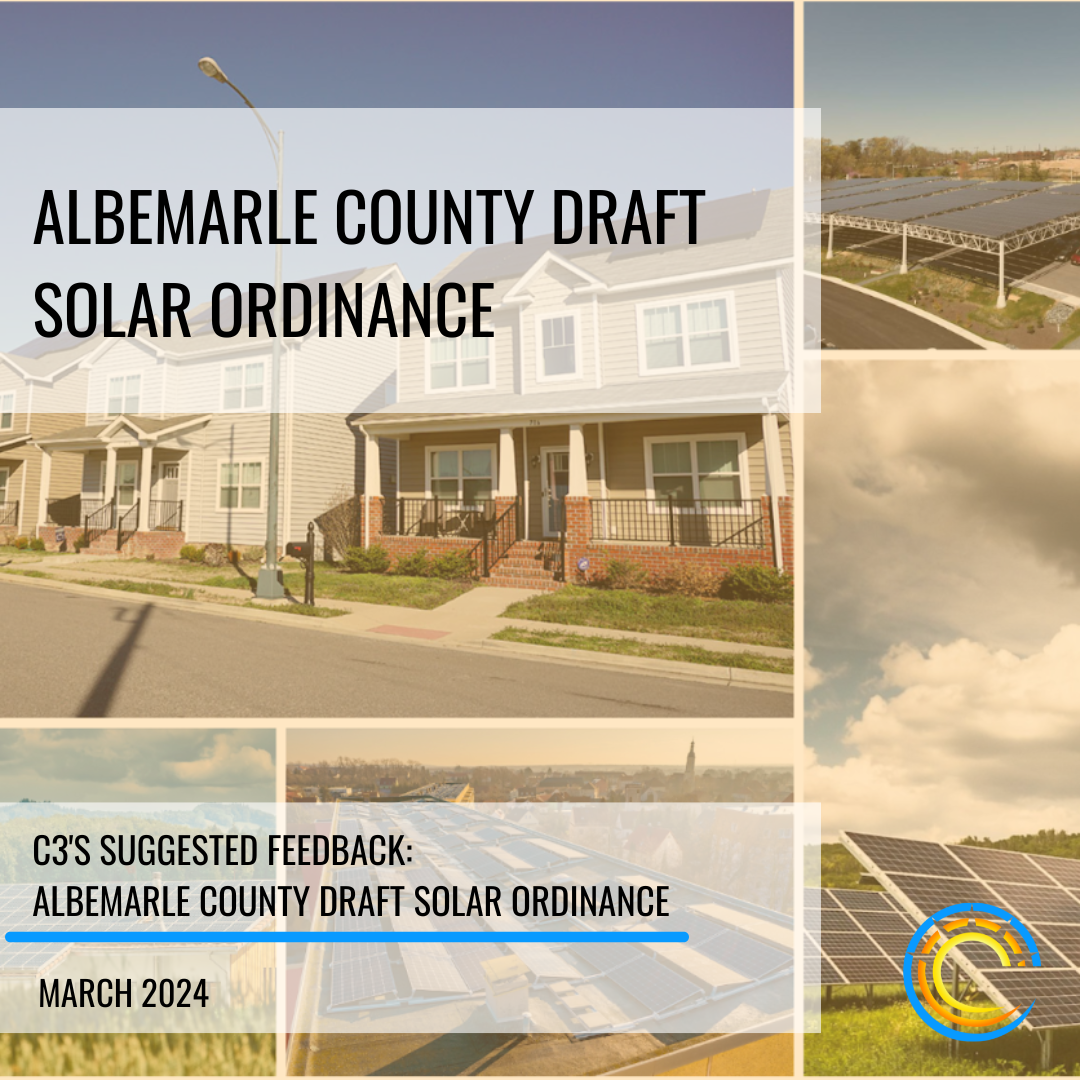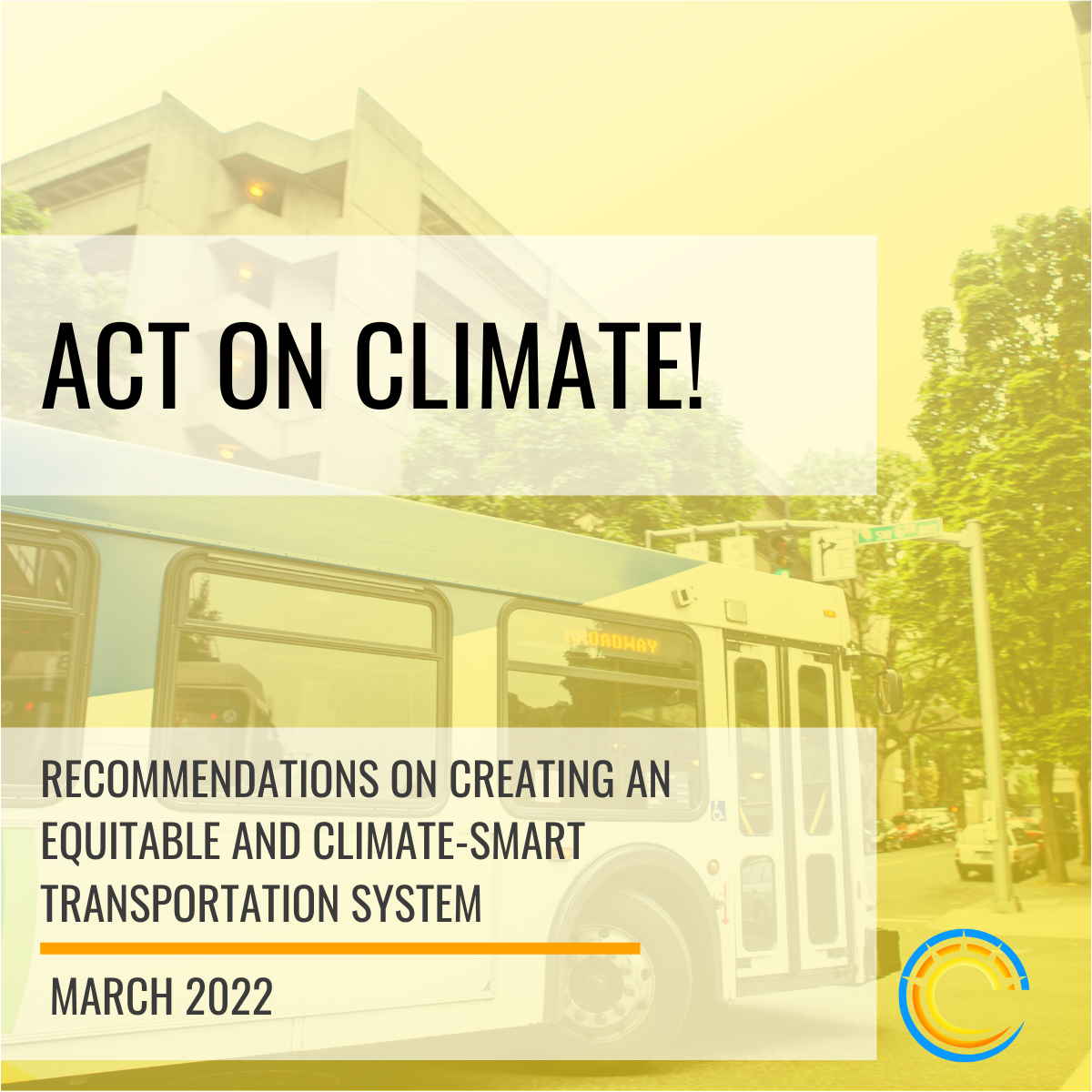C3 Recommendations
Making advocacy simple.
We want you to feel empowered when you add your voice to the climate conversation, whether that’s advocating for local climate actions or state-level initiatives. Add your voice to our most recent sign-on letter here!
This FAQ provides an overview of solar photovoltaic (PV) projects in the United States, specifically focusing on technology, environmental impacts, and sizing. It aims to help readers understand the impact that solar ordinances and permitting processes can have on solar development, ultimately arguing for just and streamlined deployment of solar.
This FAQ is designed to help community members understand the details and nuances of solar development in Albemarle County, and underscores priorities that C3 believes was missing from the County’s first draft solar ordinance. It focuses on streamlining permitting processes, the concept of historic and scenic resource preservation, and land use concerns.
Charlottesville Area Transit (CAT) is seeking feedback on its draft 10-year Transit Strategy Plan (TSP), which details improvements and changes to the network over the coming decade. Feedback is due soon with a deadline of May 31st, 2024, so to help you in getting your voice heard, C3 has put together a set of Talking Points, containing links to the plan and additional engagement opportunities.
The Charlottesville-Albemarle Metropolitan Planning Organization (CA-MPO) has released its Long-Range Transportation Plan Draft (LRTPD), and your feedback can make a real difference. We understand that diving into a 115-page document can be daunting. Your feedback is crucial in shaping the future of transportation in our community, so to help we've compiled some key talking points to help you provide feedback with ease.
In March 2024, Albemarle County released its draft solar ordinance for feedback from the local community. This letter includes C3's formal recommendations and feedback to the County, and advocates for the rapid, responsible, and equitable deployment of solar to meet climate goals.
Albemarle County recently released a draft solar ordinance setting out rules for solar energy facilities in the County. These talking points focus on areas for improvement identified by C3 and are designed to empower community members to communicate their priorities to the County.
Advocate for a smart solar ordinance to transform our community's energy future!
The transportation sector is the leading source of GHG emissions in the United States. In December 2023, C3 and other local organizations co-authored a community letter calling for zero-emission buses (ZEBs) in Charlottesville. This letter discusses the adverse environmental, economic, and human health impacts of diesel buses, and argues for a cleaner, more accessible transit system for all.
In March 2023, organizations and businesses in the Charlottesville area co-authored a letter regarding the proposed solar project in nearby Woodridge, VA. Applying C3's Solar Climate Justice Scorecard, the project ranked highly in both climate justice and environmental benefits. This letter calls for the County to grant Hexagon Energy a special-use permit to develop solar and secure a cleaner energy future for local communities.
In Charlottesville, transportation and residential building energy use account for about 60% of the City’s greenhouse gas (GHG) emissions. Zoning laws encouraging mixed-use neighborhoods, smart growth, and transit-oriented development reduce the community’s car-dependence, increase location efficiency, and may even contribute to higher housing energy efficiency. Learn more about our partner-supported zoning recommendations here.
In recent years, Charlottesville’s greenhouse gas (GHG) emissions from buildings have decreased steadily, consistent with community-wide GHG reduction. However, natural gas GHG emissions are rising. As of 2019, GHG emissions from natural gas use accounted for 19% of the community’s GHG emissions, up from 16% in 2016. Charlottesville’s ownership of its natural-gas utility provides the city with unique tools and pathways toward meeting its climate goals. Check out C3’s recommendations for rapidly and equitably decarbonizing Charlottesville Gas.
How we grow and access food is intricately connected with climate change mitigation and resilience. Decisions that the Charlottesville community makes on food justice will have key implications for our climate progress, and Cultivate Charlottesville and C3 partnered to highlight the intersection of Climate Justice and Food Justice as well as craft a series of recommendations.
C3 and partner organizations in the social justice and environmental space authored a community sign-on letter for recommendations to Charlottesville’s Climate Action Plan. This letter calls for a more targeted implementation strategy and posits precise recommendations to improve energy equity, reduce fossil fuel dependence, and advance transportation equity, food justice, and climate-smart zoning. Click here to sign the community letter.
Transportation represented 52% of greenhouse gas (GHG) emissions in Albemarle in 2018 and 28% of emissions in Charlottesville in 2016. Improving and expanding our public transit system will help the City of Charlottesville reduce emissions from transportation while creating a more equitable and more accessible community.
In June 2021, non-profit and for-profit businesses in Charlottesville authored a community sign-on letter regarding the City's fossil-fuel infrastructure. Considering the adverse environmental and health impacts of GHG emissions, the letter calls for the decarbonization and transformation of the public transit system and the local gas utility.
In June 2020, C3 formulated a set of climate policy recommendations for the City of Charlottesville’s FY 2021 budget. This document includes an analysis of local trends and identifies opportunities to support climate action in the City and engage with environmental issues related to energy consumption, transportation, and municipal planning.
In March, 2020, Albemarle County published its Climate Action Plan (CAP) Phase 1 draft with considerations to community input collected during the Climate Mondays public participation process. This report provides key highlights and suggestions for community stakeholders to consider when providing feedback to the County on the draft plan.
In 2019, the Virginia General Assembly approved HB 2332, which required the State Corporation Commission (SCC) to convene a stakeholder process to obtain recommendations for electricity data access and provide a report to the General Assembly by April 1, 2020. C3 took a leadership role in the process, examined viable options, and provided recommendations that advocate for data access.
Climate touches every aspect of our community — our health, our food, our economic well-being, and the affordability of our homes and businesses. C3 asks Charlottesville City Council to adopt a resolution to develop Charlottesville’s Comprehensive and Strategic Plans with a climate lens that serves as a guide for the prioritization of intersectional solutions.
State-level policies and legislations are indispensable for enabling and strengthening municipal climate action. This document compiles a set of state-level climate policies that can complement recent progress made by the Virginia’s General Assembly and further advance the Commonwealth’s state and municipal climate leadership.



















